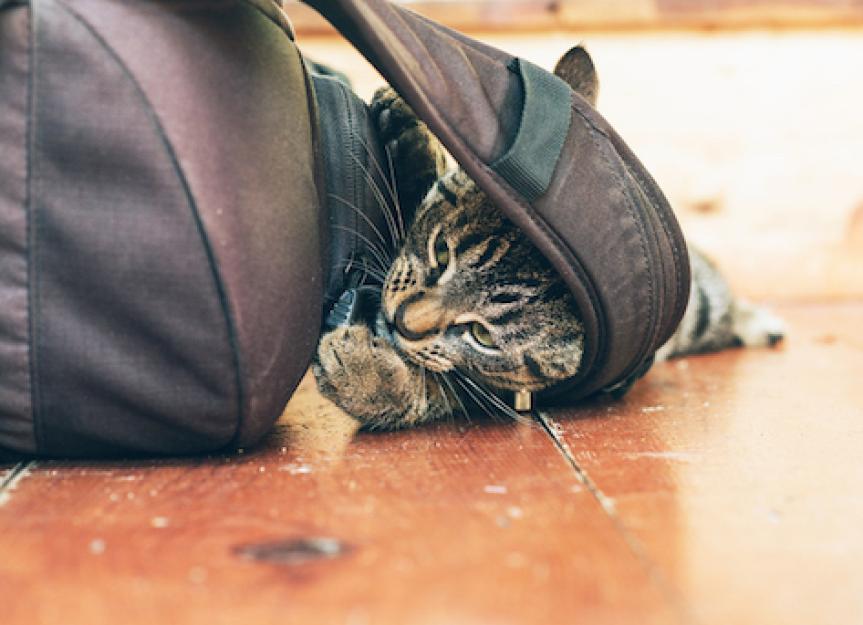Why Do Cats Chew on Things?
By Kate Hughes
不像狗,因爱而臭名昭著chewing, cats aren’t particularly known for nibbling on much other than food. However, chewing is a somewhat common behavior in cats. “Consider a cat’s prey,” says Dr. Carlo Siracusa, clinical assistant professor of behavior medicine at the University of Pennsylvania School of Veterinary Medicine in Philadelphia. “Cats have to chew on their prey to disassemble the bodies and eat. It’s a behavior that can very easily enter other areas of a cat’s life.”
Cats may chew on everything from plastic bags and wires to wood and certain types of fabrics. While the behavior on its own shouldn’t necessarily be cause for alarm—cats just sometimes like to chew on stuff—if a cat’s urge to chew becomes compulsive, it can lead to serious issues.
The Chewing Spectrum
Dr. Nicolas Dodman, a pet behavior expert, professor emeritus at the Cummings School of Veterinary Medicine at Tufts University, and author ofThe Cat Who Cried for Help, says that chewing in cats occurs on a spectrum, much like other behaviors. “There is no such thing as normal or abnormal behaviors,” he explains. “Everything is on a spectrum. So at one of the spectrum you may have cats that don’t chew at all, unless they’re eating their kibble. But at the other end, you’ve got a cat that is completely obsessed with eating fabrics, shower curtains, and shoelaces. Almost like a 10-pound moth.”
According to Dodman, if a cat is on the severe end of the chewing spectrum, the damage he may inflict on his surroundings could be to the tune of thousands of dollars. Dodman mentions that he once knew a woman who sacrificed a woolen sweater to her cat. “She said, ‘What’s the point of trying to hide it? He’ll always get to it.’ So she left it out in the open for him to chew on so he’d leave her other wool clothing alone. She brought it in once for me to see it—it looked like she hung it on a line and shot it point-blank with a shotgun.”
However, the more concerning factor is the danger the behavior may pose to the cat. Wires, in particular, can be very hazardous when a pet parent is dealing with a cat who chews. “I’ve seen really nasty burns on cats who chewed through wires,” Dodman describes. “And that’s just the burns. Obviously, chewing on wires can also give a cat a terrible shock.”
Why Might Cats Chew
Chewing behavior comes pretty naturally to cats, and Siracusa says they may become more pronounced in indoor cats due to their lifestyle. “Cats’ instinctual feeding and exploratory behaviors are tied to chewing,” he explains. “But cat food—both kibble and wet food—is not a natural food for cats. When an animal is set up to perform a certain behavior by instinct, but you change that animal’s environment, that behavior doesn’t go away. It persists.”
As such, some chewing by cats can be expected; it’s just when the behavior becomes compulsive that owners should start taking notice. Dodman likens more serious chewing to obsessive compulsive disorder in humans. “A lot of the more extreme chewing behaviors are brought on by anxiety,” he says. “You tend to see it more in high-strung breeds like Siamese cats, or just cats that have anxious, nervous, or fearful dispositions. It’s much less common in the more laid-back breeds, like Persians.”
Dodman also notes that anxiety can also manifest as suckling or hair-pulling behaviors, which studies have shown are often seen in cats who were weaned too early. “When cats are deprived of nursing opportunities, they’re almost set up for a compulsive disorder that’s related to nursing. That’s why so many cats with anxiety have compulsive oral behaviors,” he describes.
Addressing Chewing Behaviors
If a cat does exhibit compulsive chewing behaviors, there are several options for owners. The first is to redirect the behavior with toys or even chew treats. “Many cats do settle down when provided with a toy that they can chew on,” Siracusa says. “The toys stimulate the predatory behaviors and, in many cases, it will satisfy the urge to chew.”
这种方法往往与猫是最好的工作only occasional chewers. If the cat is compulsive, then further action will need to be taken. In more severe cases, Dodman has prescribed mood-stabilizing medication. “Anti-obsession drugs, like those in the Prozac family, work really well when treating compulsive disorders. They help reduce anxiety and just stabilize an animal’s take on the world. So if your cat is stressed or anxious because you’re at work all day, over time, these drugs will help prevent them from becoming upset,” he describes. These medications must be prescribed, so if a cat has compulsive chewing behaviors, schedule an appointment with your veterinarian.
Pet parents should also take their cat to the vet if chewing is accompanied by other concerning behaviors, such as vomiting or diarrhea, Siracusa adds. “These all are indicative of further issues that should be addressed by a veterinarian.”
Help us make PetMD better
Was this article helpful?
